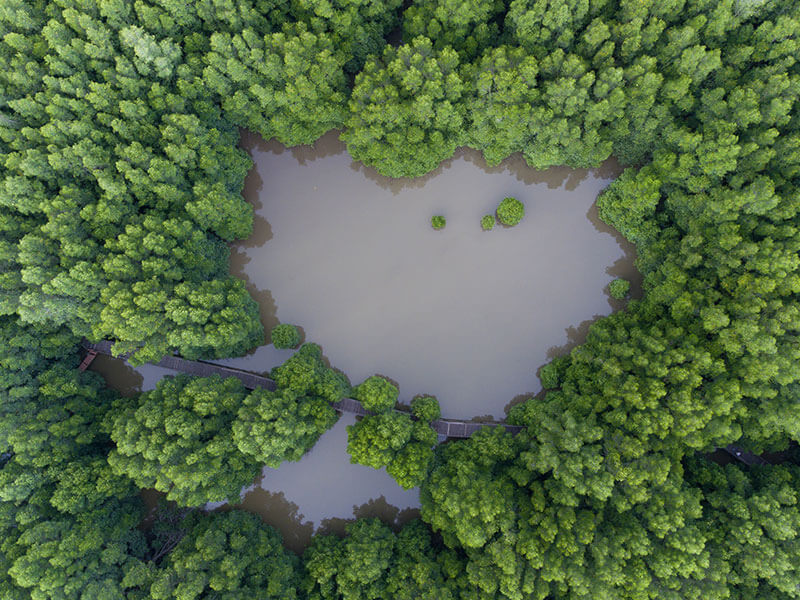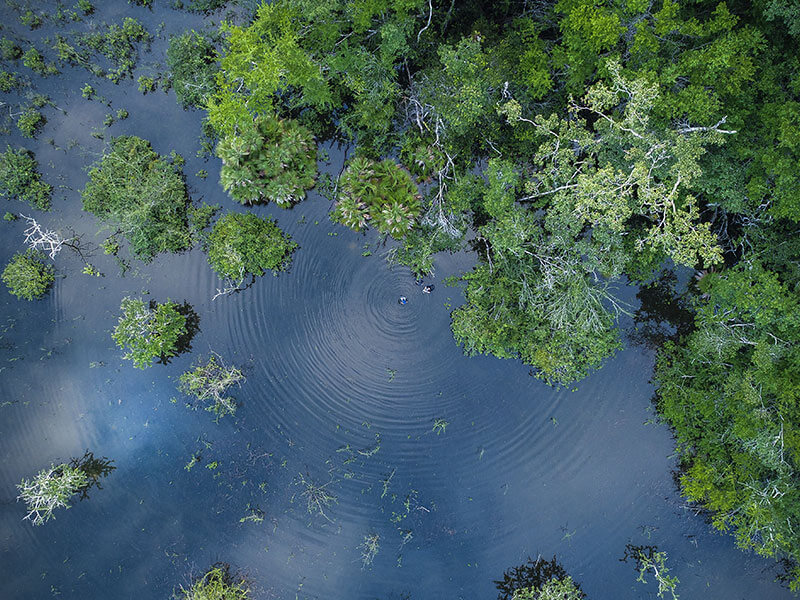Wetlands, our allies to lower global emissions
Wetlands are varied terrestrial ecosystems that, although occupying only 7% of the earth’s surface, store 33% of the world’s terrestrial carbon. Marshes, floodplains, and peatlands are the natural habitats of 1 million species threatened with extinction, and they provide livelihoods, food and fresh water to around 1 billion people worldwide. Freshwater wetlands, in particular peatlands, contain great amounts of carbon locked in the submerged soil or as waterlogged undecomposed organic material.
When these ecosystems are drained to be converted into agricultural or forestry exploitations, and/or for extracting peat or other minerals, they release greenhouse gases (GHG), especially carbon dioxide, methane and nitrous oxide, increasing global warming, and therefore, consequent climate change. This, in turn, may cause floods, droughts and fires, feeding a vicious cycle and accelerating climate disruption with many negative impacts.



"Sustainable restoration and conservation of terrestrial wetlands"
REWET: maximising wetlands carbon absorption respecting their biodiversity
The objective of the REWET project is to facilitate sustainable restoration and conservation of terrestrial wetlands.
The objective of the REWET project is to facilitate sustainable restoration and conservation of terrestrial wetlands, including freshwater wetlands, peatlands, and floodplains, by applying fit-for-purpose technologies to monitor greenhouse gas emissions, biodiversity, meteorological events, and social aspects of sustainability.
REWET project focuses on determining how the restoration and management of wetlands can be optimised to maximise their carbon uptake while in balance with type-specific natural processes and biodiversity.
Promoting science-based knowledge for wetlands restoration
The assessment of EU wetlands status in Europe and the modelling activities involving wetlands are the project’s strongest scientific pillars.
Validated within the Open Labs, the methodology designed in REWET will fill out the gaps in wetlands science and provide guidance for cost-effective restoration and monitoring practices that are environmentally friendly and compatible with the future climate.
As main outcomes, REWET will deliver a wetlands inventory with carbon sink potential, models for wetlands greenhouse gases (GHG) emissions/sequestration under different scenarios, policy recommendations, a business model and a roadmap for replication.
Digital tools for wetland data and collaboration
Explore two powerful digital tools from the REWET project: the Multi-Stakeholder Platform, a collaborative space for wetland conservation and climate resilience, and WETSET, a centralised wetlands data hub supporting environmental research and restoration planning.
REWET field research
Open labs to assess wetlands restoration activities
In close consultation with researchers, private sector actors and responsible agencies at the local and regional levels, the REWET project draws upon the network of carefully selected seven demonstrators (Open Labs)
The Open Labs cover a range of local conditions, geographic characteristics, governance structures and social/cultural settings to fully understand the wetlands-carbon-climate nexus and provide a replication plan to boost successful wetlands restoration throughout Europe and internationally.
The heterogeneity of the Open labs will allow the application of different restoration methodologies while following the same monitoring plan to provide replicable knowledge.
An important feature of the project is its holistic nature: in fact, it considers not only technical and environmental aspects, but also economic and social ones, including national policies and the opportunities they might offer for wetland restoration, with the aim of creating a sustainable wetland restoration technology that can be applied widely across Europe

REWET policy background
EU policy and wetlands

REWET’s objectives are in line with the 2030 EU Biodiversity Strategy, the European Climate Law (adopted on 28 June 2021) and the EU Green Deal – Fit for 55 (adopted on 14 July 2021) target to reduce emissions by at least 55% by 2030, compared to 1990 levels.
A relevant part of the REWET activities will be devoted to providing policy recommendations at EU, national and international levels. In fact, one of the main tasks focuses on the fostering and implementation of the EU Green Deal (Climate, Biodiversity) and major EU frameworks.
Knowledge and evidence from REWET’s Open Labs and other experiences (projects/programmes/initiatives) will be gathered as an effective approach to achieving EU 2030 Climate and Biodiversity targets, at the same time contributing to the global targets agreed upon in the Paris Climate Agreement and 2030 Global Biodiversity Framework and for the upcoming LULUCF Regulation in the EU.
The REWET project aims to support the EU Nature Restoration Plan of the EU Biodiversity Strategy for 2030 and the implementation of the LULUCF Regulation for the inclusion of wetland restoration activities by developing robust and transparent methodologies, data provision and analysis.
Who is working on Rewet?

















